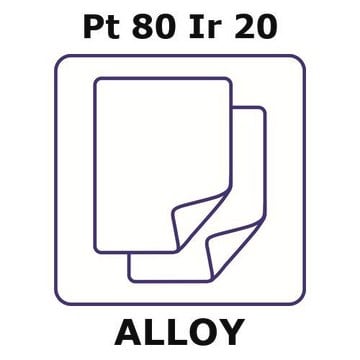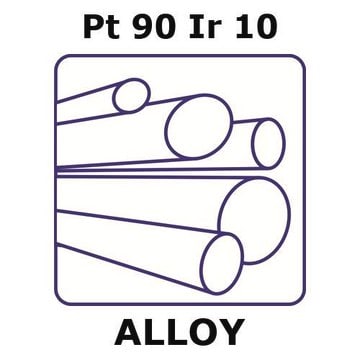Összes fotó(2)
Fontos dokumentumok
GF96543209
Iridium
foil, 25x25mm, thickness 0.125mm, as rolled, 99.9%
Szinonimák:
Iridium, IR000210
Bejelentkezésa Szervezeti és Szerződéses árazás megtekintéséhez
Összes fotó(2)
About This Item
Tapasztalati képlet (Hill-képlet):
Ir
CAS-szám:
Molekulatömeg:
192.22
MDL-szám:
UNSPSC kód:
12141720
PubChem Substance ID:
NACRES:
NA.23
Javasolt termékek
Teszt
≥99.9%
Forma
foil
gyártó/kereskedő neve
Goodfellow 965-432-09
ellenállás
4.71 μΩ-cm
bp
4130 °C (lit.)
mp
2450 °C (lit.)
sűrűség
22.65 g/cm3 (lit.)
SMILES string
[Ir]
InChI
1S/Ir
Nemzetközi kémiai azonosító kulcs
GKOZUEZYRPOHIO-UHFFFAOYSA-N
Looking for similar products? Látogasson el ide Útmutató a termékösszehasonlításhoz
Általános leírás
For updated SDS information please visit www.goodfellow.com.
Jogi információk
Product of Goodfellow
Válasszon a legfrissebb verziók közül:
Analitikai tanúsítványok (COA)
Lot/Batch Number
Sajnos jelenleg COA nem áll rendelkezésre ehhez a termékhez online.
Ha segítségre van szüksége, lépjen velünk kapcsolatba Vevőszolgálat
Már rendelkezik ezzel a termékkel?
Az Ön által nemrégiben megvásárolt termékekre vonatkozó dokumentumokat a Dokumentumtárban találja.
Paolo Tosatti et al.
Organic & biomolecular chemistry, 10(16), 3147-3163 (2012-03-13)
Since their discovery in 1997, iridium-catalysed asymmetric allylic substitutions have been developed into a broadly applicable tool for the synthesis of chiral building blocks via C-C and C-heteroatom bond formation. The remarkable generality of these reactions and the high levels
Stephen J Roseblade et al.
Accounts of chemical research, 40(12), 1402-1411 (2007-08-04)
Asymmetric hydrogenation is one of the most important catalytic methods for the preparation of optically active compounds. For a long time the range of olefins that could be hydrogenated with high enantiomeric excess was limited to substrates bearing a coordinating
Low-valent ruthenium and iridium hydride complexes as alternatives to Lewis acid and base catalysts.
S Murahashi et al.
Accounts of chemical research, 33(4), 225-233 (2000-04-25)
The discovery of a new chemical reaction often leads to new applications and new chemical principles. Low-valent ruthenium and iridium hydride complexes are highly useful redox Lewis acid and base catalysts. Nitriles are activated by these catalysts and undergo reactions
Veronica Marin et al.
Chemical Society reviews, 36(4), 618-635 (2007-03-28)
The need for novel materials with luminescent properties and advanced processing features requires reliable and reproducible synthetic routes for the design of suitable materials, such as e.g. polypyridyl ruthenium(II) and iridium(III)-containing polymers. The most popular ligand for those purposes is
Etienne Baranoff et al.
Chemical Society reviews, 33(3), 147-155 (2004-03-18)
In order to mimic the photosynthetic reaction centre and better understand photoinduced electron transfer processes, a family of compounds has been studied for the past 15 years. These are transition metal complexes, M(tpy)(2) where tpy is a 2,2':6',2" terpyridine based
Tudóscsoportunk valamennyi kutatási területen rendelkezik tapasztalattal, beleértve az élettudományt, az anyagtudományt, a kémiai szintézist, a kromatográfiát, az analitikát és még sok más területet.
Lépjen kapcsolatba a szaktanácsadással




